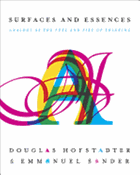
Douglas Hofstadter was just 34 years old when he published the 1979 Pulitzer Prize‑winning Gödel, Escher, Bach, a profoundly original and bravura achievement that explored how consciousness and a sense of "self" might arise from inanimate matter. Nearly 30 years later, I Am a Strange Loop (2007) offered a more contained and personal explanation of consciousness and the physical nature of thought.
Now, in Surfaces and Essences, Hofstadter and French cognitive psychologist Emmanuel Sander address the central role of analogy in thought, an important research focus in cognitive science. The result is a definitive affirmation of the argument that analogies are essential for concepts and thinking, permeating every moment and every aspect of thought. We understand the new and unfamiliar because we associate it with something familiar. Analogy is thus the core of thinking.
Hofstadter and Sander spin out this idea on multiple levels, from the personal to the cultural, from specific words, phrases and situations to abstract ideas and ultimately, to creativity. They explain that the mechanism that allows us to use the simplest words is the same mechanism that has enabled humanity's most groundbreaking discoveries and its greatest accomplishments.
They also take unbridled and often infectious pleasure in backing up each key step in their argument with a dizzying array of examples, often laced with playful humor. Surfaces and Essences shares with Hofstadter's earlier books his joy in exploration and ideas. --Jeanette Zwart, freelance writer and reviewer

